한국응용과학기술학회 논문 검색
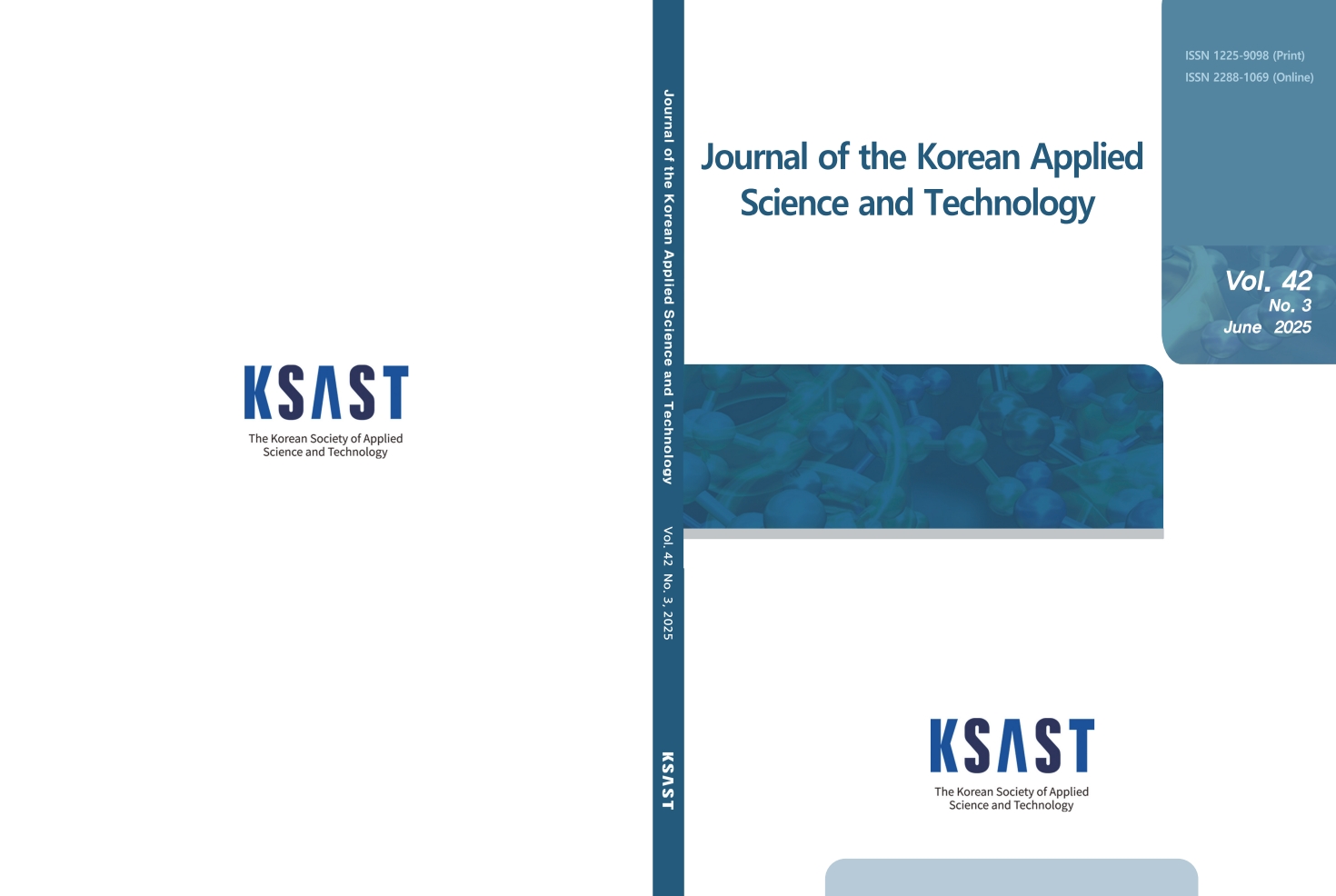
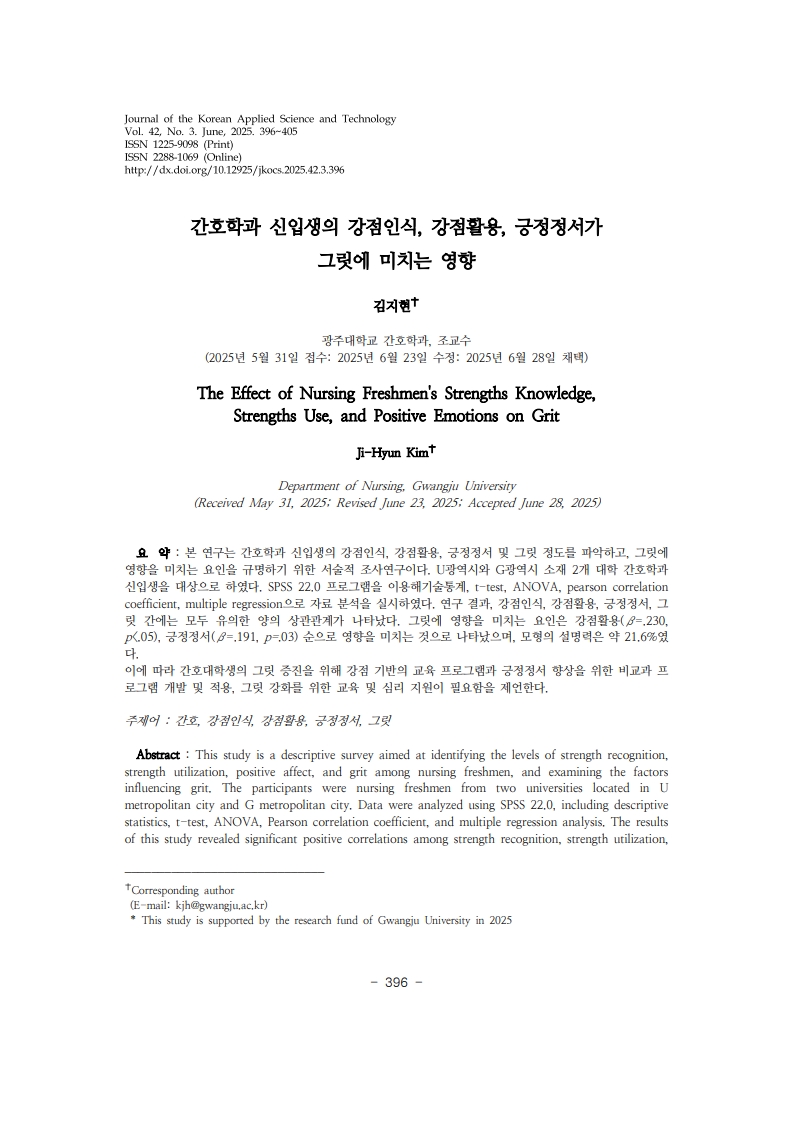
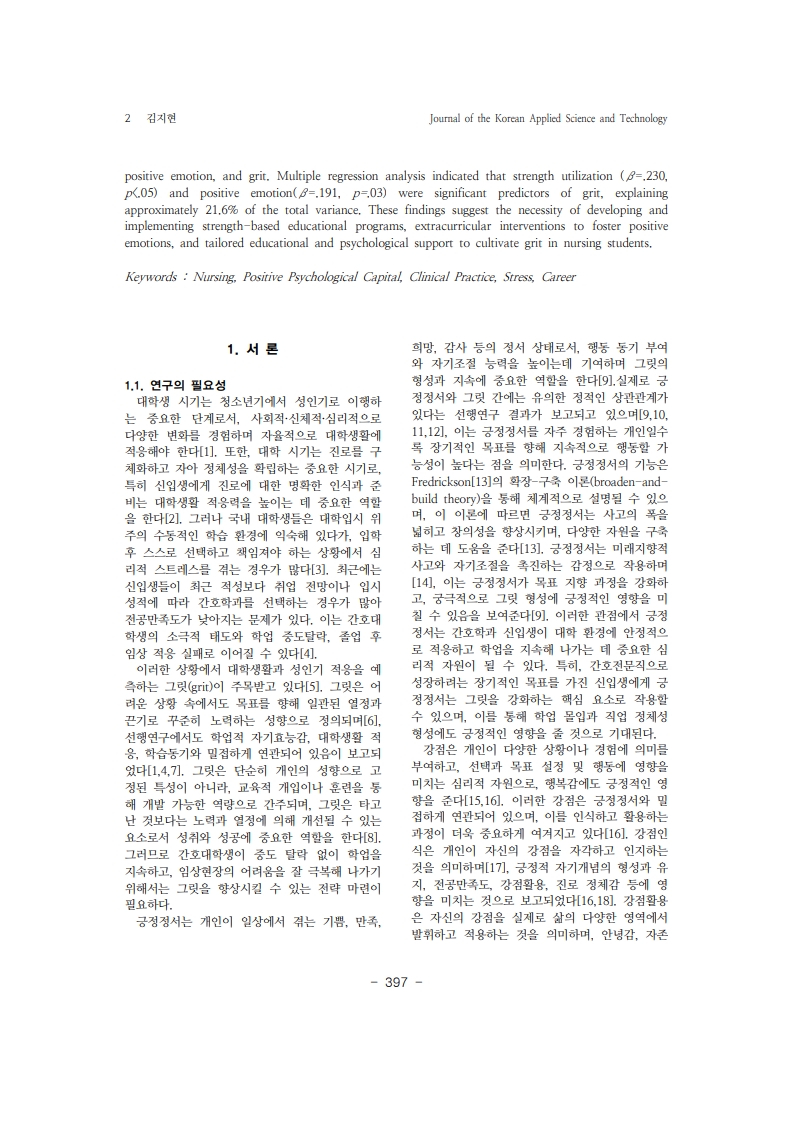
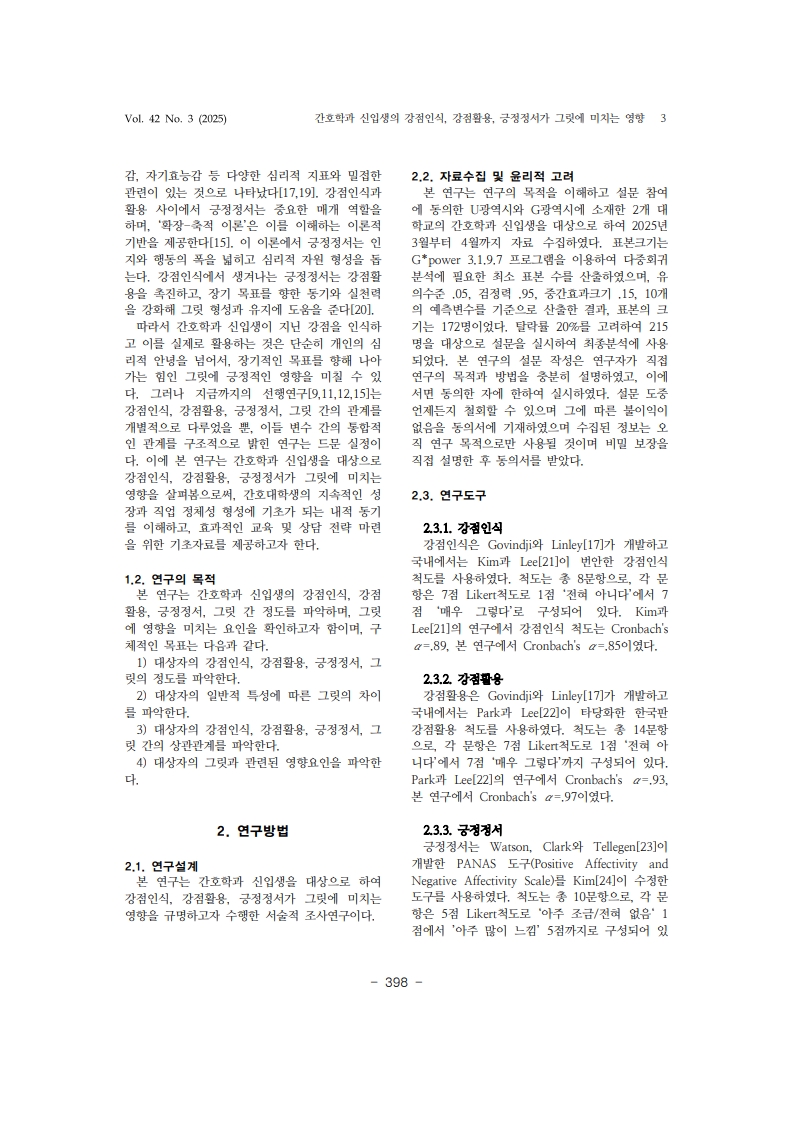
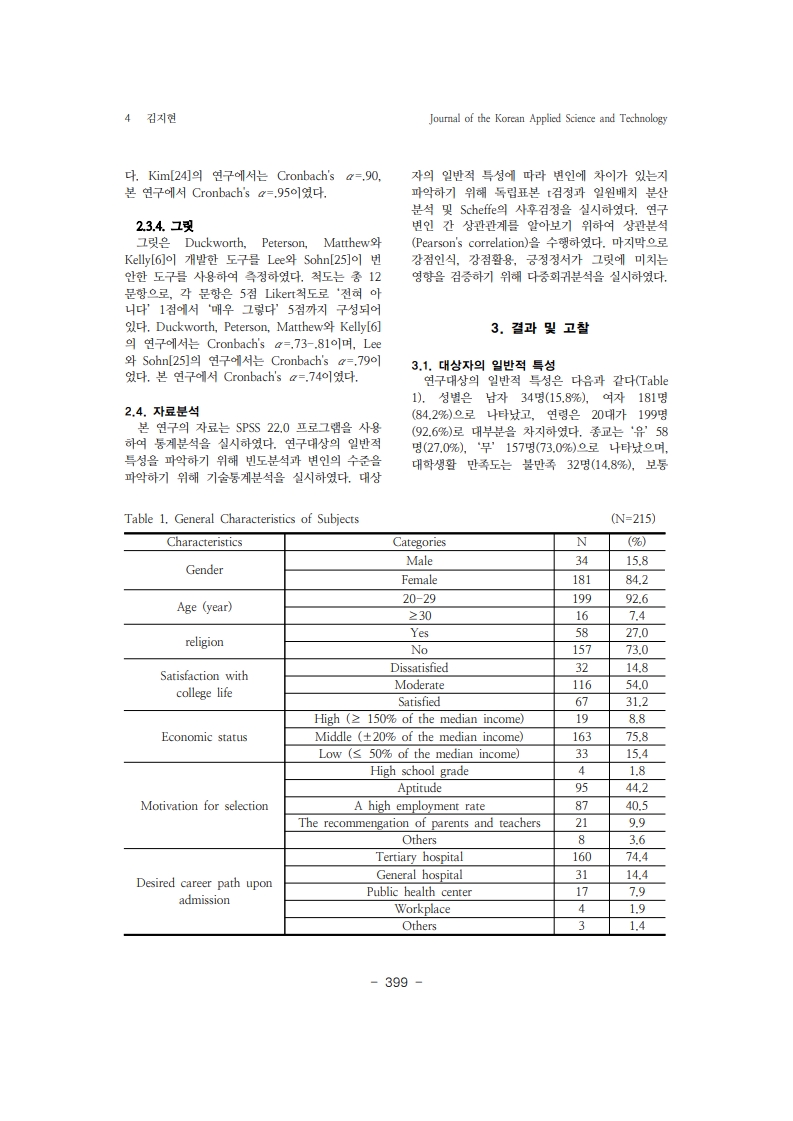
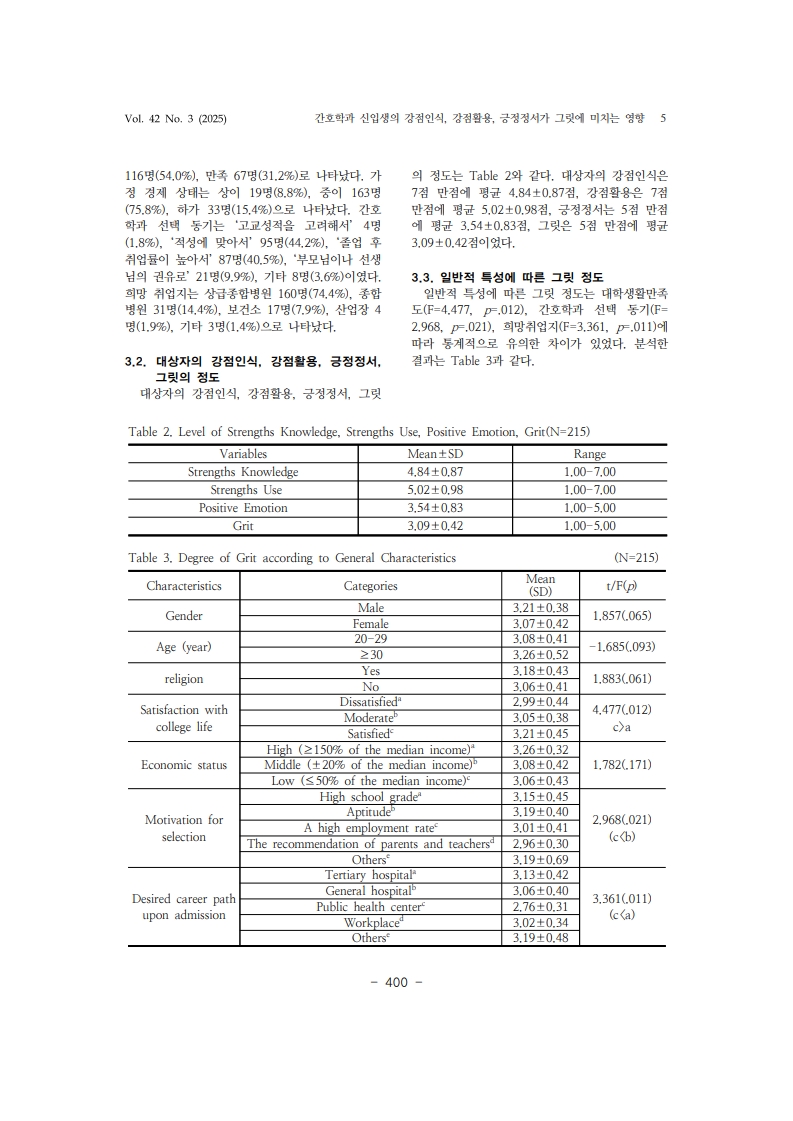
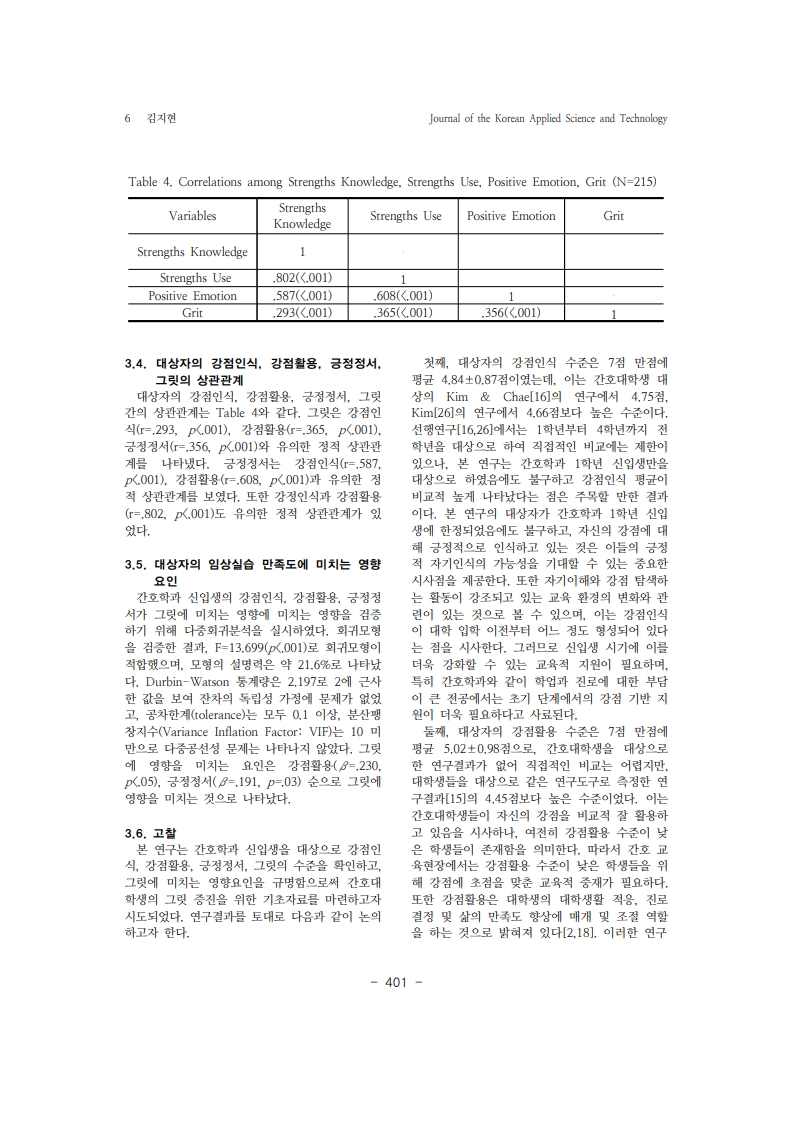
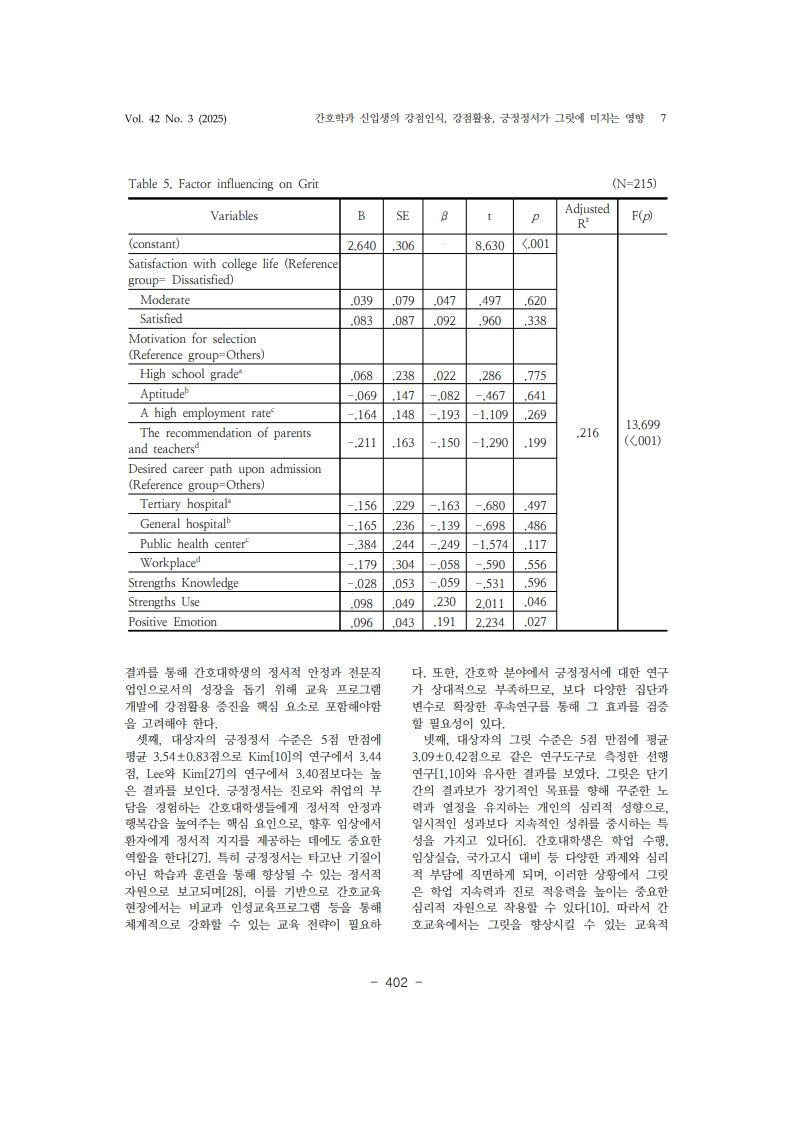
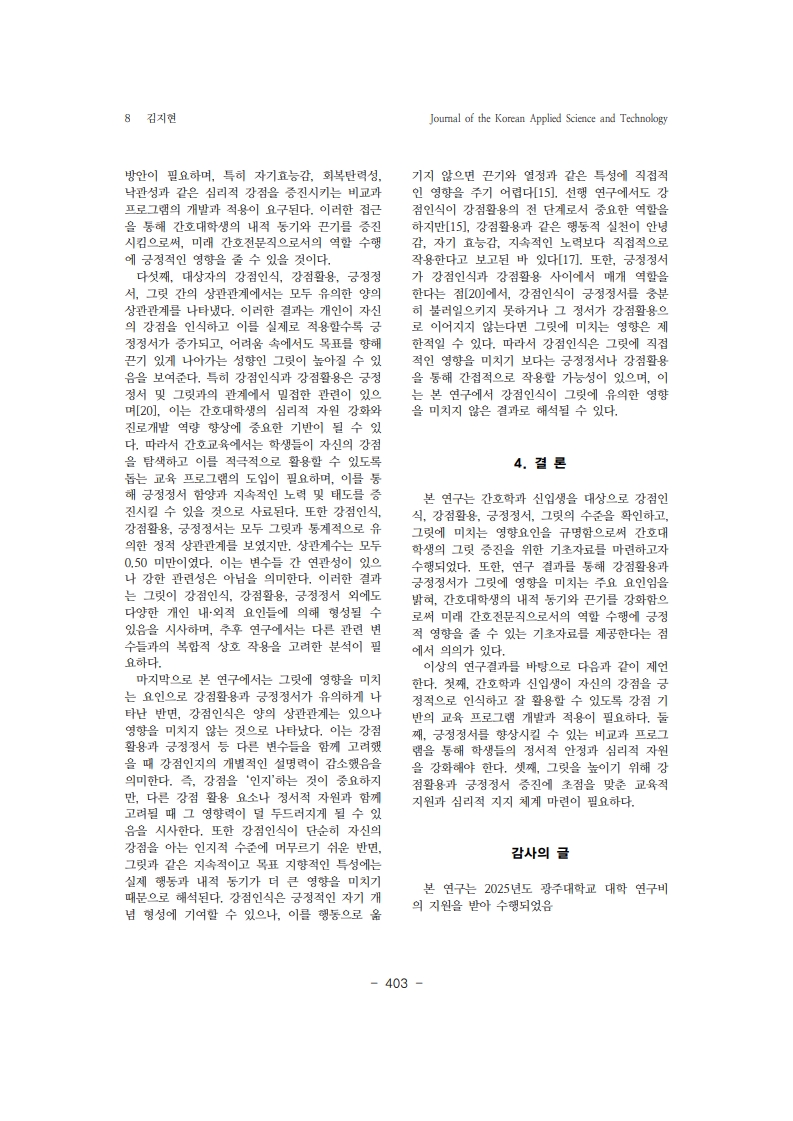
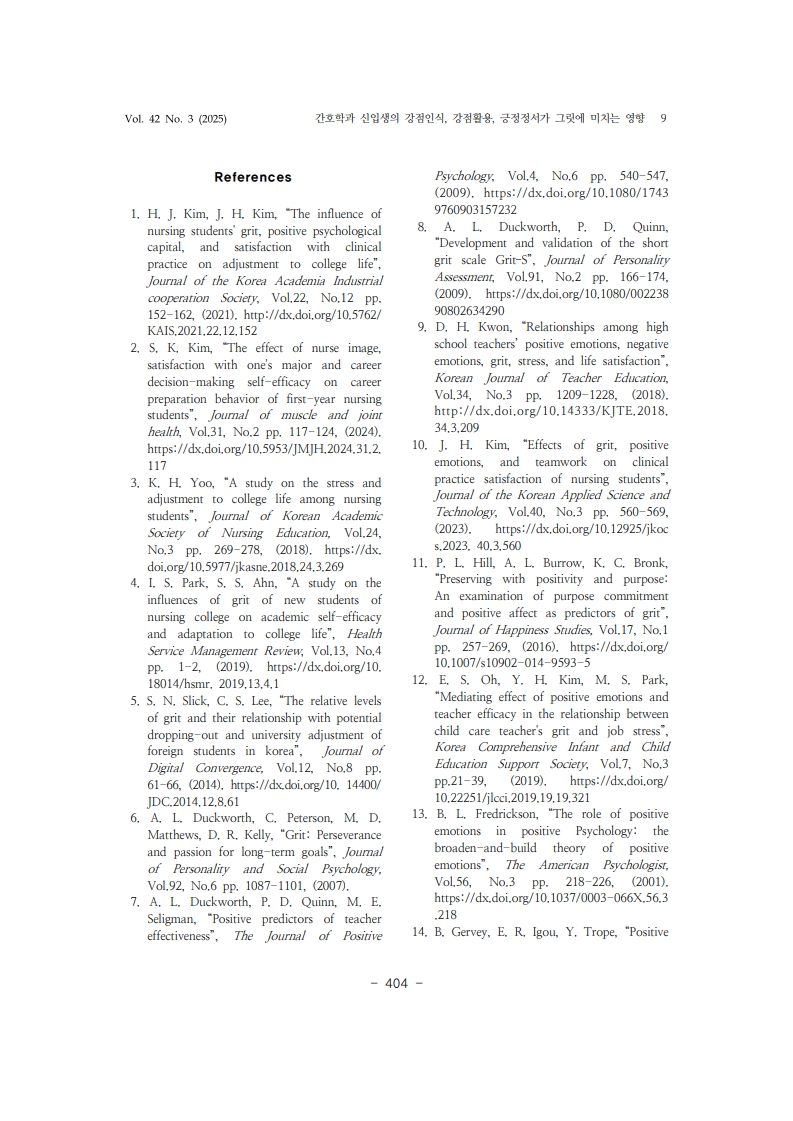
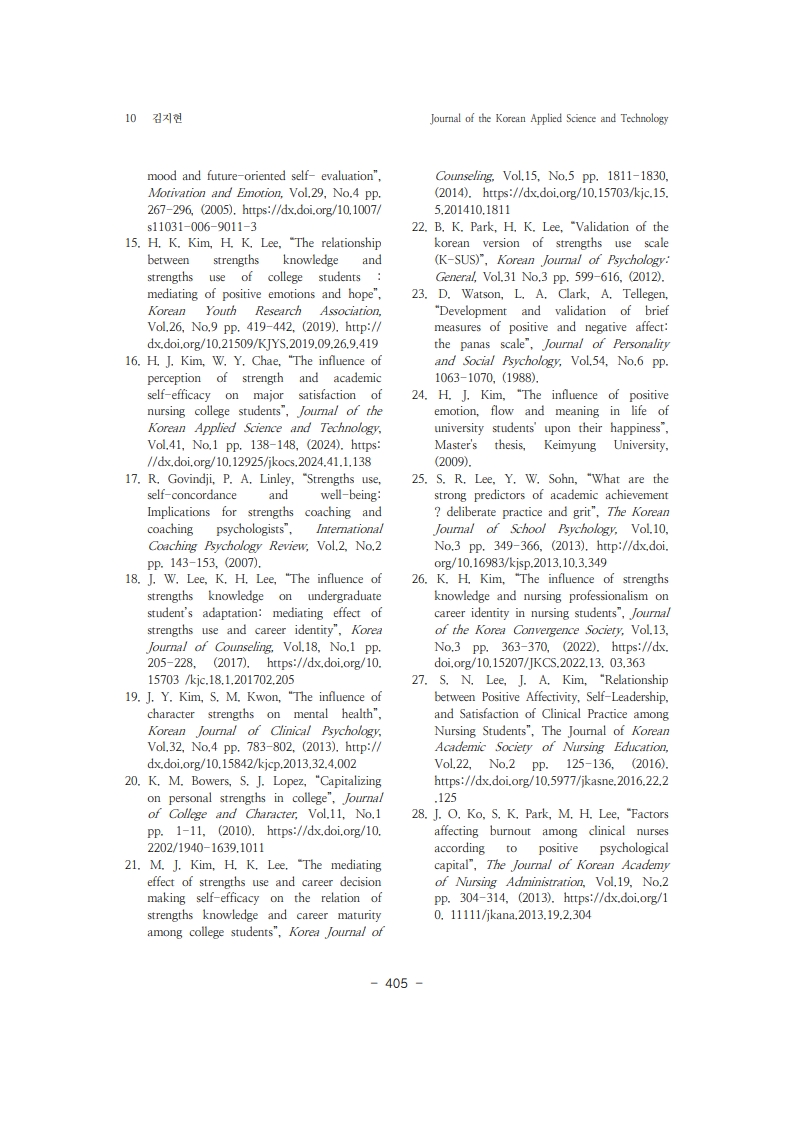
1. H. J. Kim, J. H. Kim, “The influence of nursing students' grit, positive psychological capital, and satisfaction with clinical practice on adjustment to college life”,Journal of the Korea Academia Industrialcooperation Society, Vol.22, No.12 pp. 152-162, (2021).http://dx.doi.org/10.5762/KAIS.2021.22.12.152
2. S. K. Kim, “The effect of nurse image, satisfaction with one's major and career decision-making self-efficacy on career preparation behavior of first-year nursing
students”, Journal of muscle and joint health, Vol.31, No.2 pp. 117-124, (2024).https://dx.doi.org/10.5953/JMJH.2024.31.2.117
3. K. H. Yoo, “A study on the stress and adjustment to college life among nursingstudents”, Journal of Korean Academic Society of Nursing Education, Vol.24,
No.3 pp. 269-278, (2018). https://dx.doi.org/10.5977/jkasne.2018.24.3.269
4. I. S. Park, S. S. Ahn, “A study on the influences of grit of new students ofnursing college on academic self-efficacy and adaptation to college life”, Health
Service Management Review, Vol.13, No.4 pp. 1-2, (2019).https://dx.doi.org/10.18014/hsmr.2019.13.4.1
5. S. N. Slick, C. S. Lee, “The relative levels of grit and their relationship with potential dropping-out and university adjustment offoreign students in korea”, Journal of Digital Convergence, Vol.12, No.8 pp.61-66, (2014). https://dx.doi.org/10.14400/JDC.2014.12.8.61
6. A. L. Duckworth, C. Peterson, M. D. Matthews, D. R. Kelly, “Grit: Perseveranceand passion for long-term goals”, Journal of Personality and Social Psychology,
Vol.92, No.6 pp. 1087-1101, (2007).
7. A. L. Duckworth, P. D. Quinn, M. E. Seligman, “Positive predictors of teachereffectiveness”, The Journal of Positive Psychology, Vol.4, No.6 pp. 540-547,
(2009). https://dx.doi.org/10.1080/17439760903157232
8. A. L. Duckworth, P. D. Quinn, “Development and validation of the shortgrit scale Grit–S”, Journal of Personality Assessment, Vol.91, No.2 pp. 166-174,
(2009). https://dx.doi.org/10.1080/00223890802634290
9. D. H. Kwon, “Relationships among high school teachers’ positive emotions, negative emotions, grit, stress, and life satisfaction”, Korean Journal of Teacher Education, Vol.34, No.3 pp. 1209-1228, (2018).http://dx.doi.org/10.14333/KJTE.2018.34.3.209
10. J. H. Kim, “Effects of grit, positive emotions, and teamwork on clinicalpractice satisfaction of nursing students”, Journal of the Korean Applied Science and Technology, Vol.40, No.3 pp. 560-569, (2023).https://dx.doi.org/10.12925/jkocs.2023.40.3.560
11. P. L. Hill, A. L. Burrow, K. C. Bronk, “Preserving with positivity and purpose:An examination of purpose commitment and positive affect as predictors of grit”,
Journal of Happiness Studies, Vol.17, No.1 pp. 257-269, (2016).https://dx.doi.org/10.1007/s10902-014-9593-5
12. E. S. Oh, Y. H. Kim, M. S. Park, “Mediating effect of positive emotions andteacher efficacy in the relationship between child care teacher's grit and job stress”,Korea Comprehensive Infant and Child Education Support Society, Vol.7, No.3 pp.21-39, (2019). https://dx.doi.org/10.22251/jlcci.2019.19.19.321
13. B. L. Fredrickson, “The role of positive emotions in positive Psychology: thebroaden-and-build theory of positive emotions”, The American Psychologist,
Vol.56, No.3 pp. 218-226, (2001).https://dx.doi.org/10.1037/0003-066X.56.3.218
14. B. Gervey, E. R. Igou, Y. Trope, “Positive mood and future-oriented self- evaluation”,Motivation and Emotion, Vol.29, No.4 pp. 267-296, (2005). https://dx.doi.org/10.1007/s11031-006-9011-3
15. H. K. Kim, H. K. Lee, “The relationship between strengths knowledge and strengths use of college students : mediating of positive emotions and hope”,
Korean Youth Research Association, Vol.26, No.9 pp. 419-442, (2019).http://dx.doi.org/10.21509/KJYS.2019.09.26.9.419
16. H. J. Kim, W. Y. Chae, “The influence of perception of strength and academicself-efficacy on major satisfaction of nursing college students”, Journal of theKorean Applied Science and Technology, Vol.41, No.1 pp. 138-148, (2024).https://dx.doi.org/10.12925/jkocs.2024.41.1.138
17. R. Govindji, P. A. Linley, “Strengths use, self-concordance and well-being:Implications for strengths coaching and coaching psychologists”, International
Coaching Psychology Review, Vol.2, No.2 pp. 143-153, (2007).
18. J. W. Lee, K. H. Lee, “The influence of strengths knowledge on undergraduatestudent’s adaptation: mediating effect of strengths use and career identity”, Korea
Journal of Counseling, Vol.18, No.1 pp. 205-228, (2017).https://dx.doi.org/10.15703/kjc.18.1.201702.205
19. J. Y. Kim, S. M. Kwon, “The influence of character strengths on mental health”,Korean Journal of Clinical Psychology, Vol.32, No.4 pp. 783-802, (2013).
http://dx.doi.org/10.15842/kjcp.2013.32.4.002
20. K. M. Bowers, S. J. Lopez, “Capitalizing on personal strengths in college”, Journal of College and Character, Vol.11, No.1 pp. 1-11, (2010).
https://dx.doi.org/10.2202/1940-1639.1011
21. M. J. Kim, H. K. Lee. “The mediating effect of strengths use and career decision making self-efficacy on the relation of strengths knowledge and career maturity among college students”, Korea Journal of Counseling, Vol.15, No.5 pp. 1811-1830, (2014). https://dx.doi.org/10.15703/kjc.15.5.201410.1811
22. B. K. Park, H. K. Lee, “Validation of the korean version of strengths use scale(K-SUS)”, Korean Journal of Psychology: General, Vol.31 No.3 pp. 599-616, (2012).
23. D. Watson, L. A. Clark, A. Tellegen, “Development and validation of briefmeasures of positive and negative affect: the panas scale”, Journal of Personality
and Social Psychology, Vol.54, No.6 pp. 1063-1070, (1988).
24. H. J. Kim, “The influence of positive emotion, flow and meaning in life ofuniversity students' upon their happiness”, Master's thesis, Keimyung University,
(2009).
25. S. R. Lee, Y. W. Sohn, “What are the strong predictors of academic achievement ? deliberate practice and grit”, The Korean Journal of School Psychology, Vol.10, No.3 pp. 349-366, (2013).http://dx.doi.org/10.16983/kjsp.2013.10.3.349
26. K. H. Kim, “The influence of strengths knowledge and nursing professionalism on career identity in nursing students”, Journal of the Korea Convergence Society, Vol.13, No.3 pp. 363-370, (2022).https://dx.doi.org/10.15207/JKCS.2022.13.03.363
27. S. N. Lee, J. A. Kim, “Relationship between Positive Affectivity, Self-Leadership,and Satisfaction of Clinical Practice among Nursing Students”, The Journal of Korean Academic Society of Nursing Education,Vol.22, No.2 pp. 125-136, (2016). https://dx.doi.org/10.5977/jkasne.2016.22.2.125
28. J. O. Ko, S. K. Park, M. H. Lee, “Factors affecting burnout among clinical nurses according to positive psychological capital”, The Journal of Korean Academy of Nursing Administration, Vol.19, No.2 pp. 304-314, (2013).https://dx.doi.org/10.11111/jkana.2013.19.2.304

